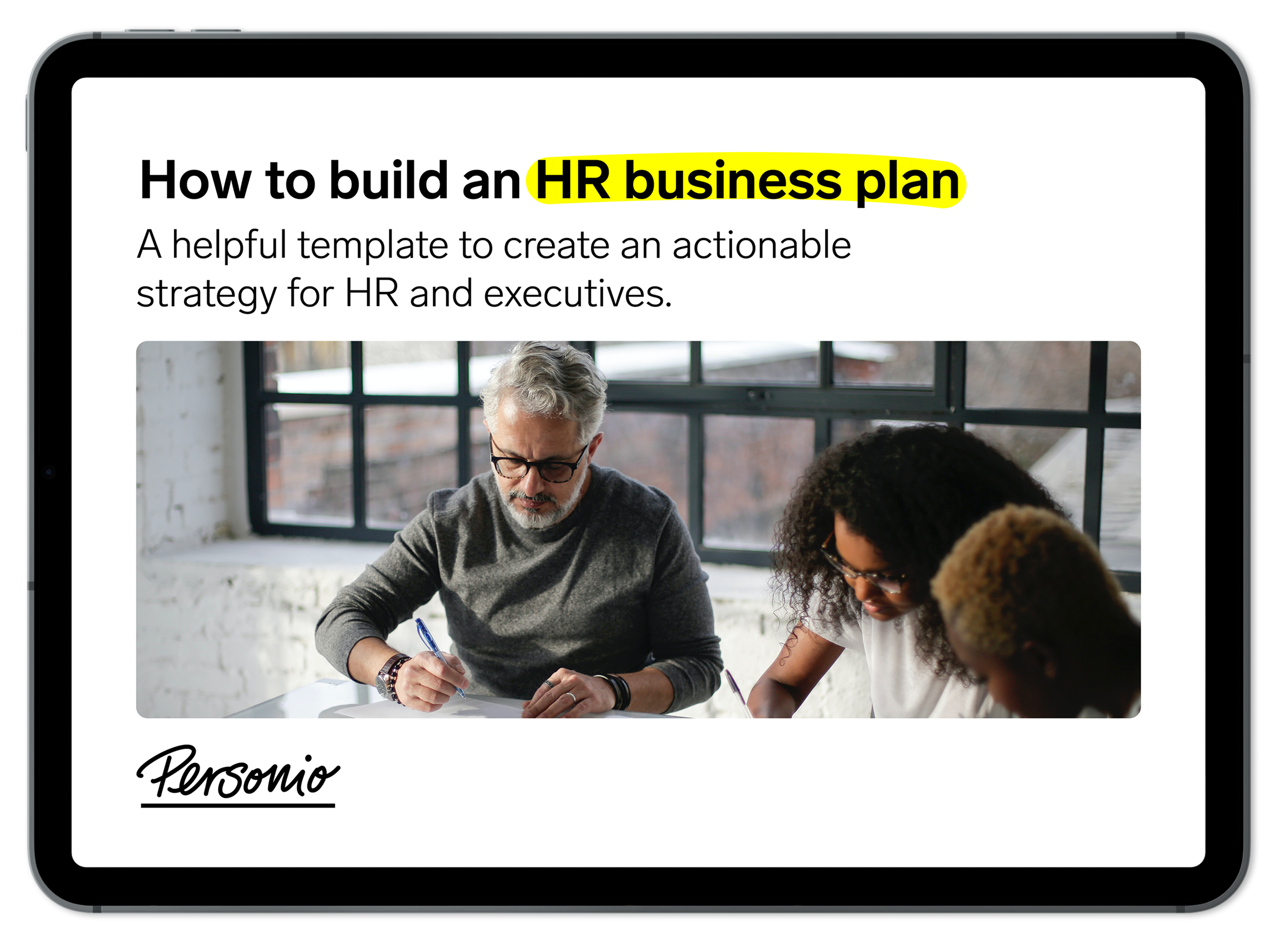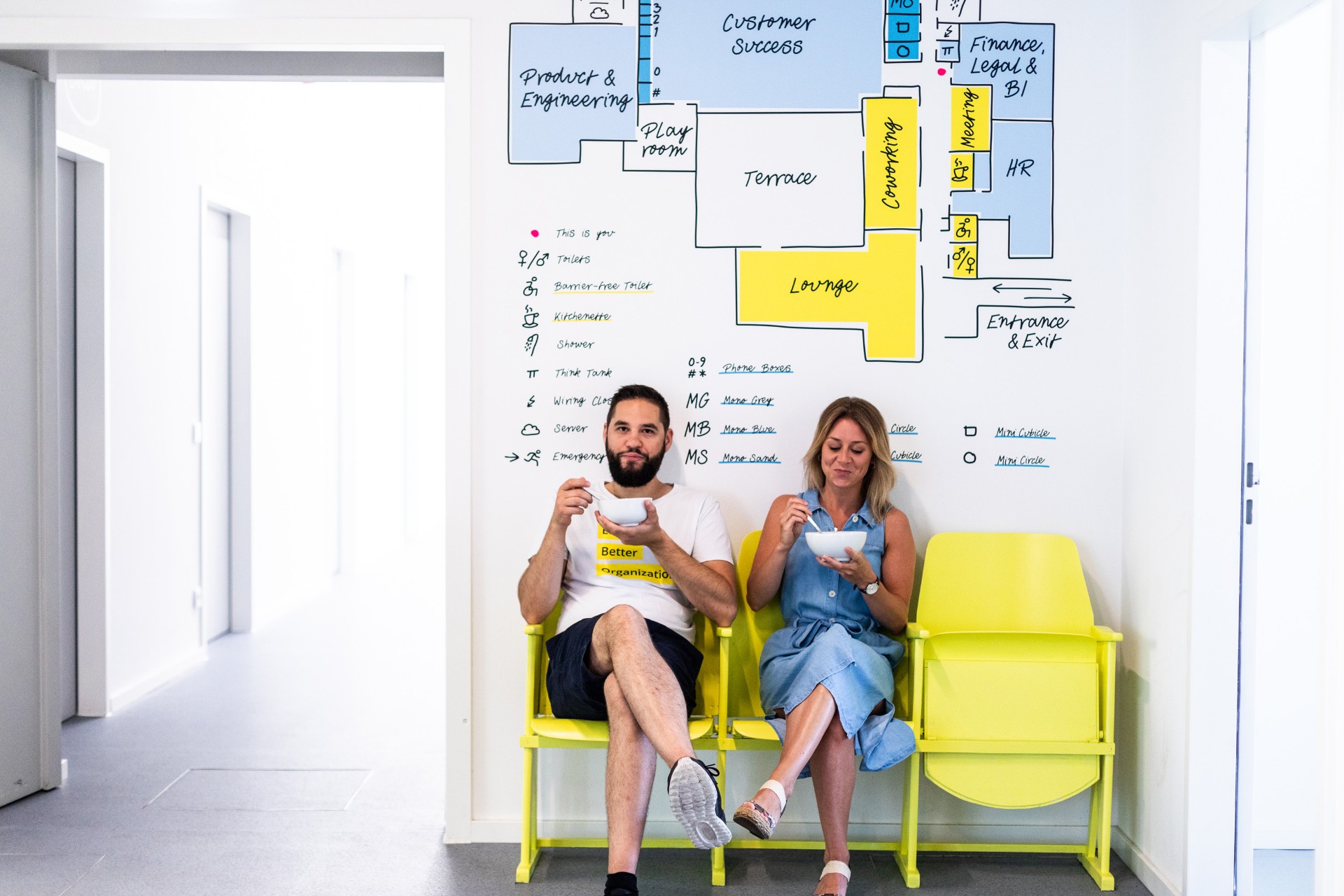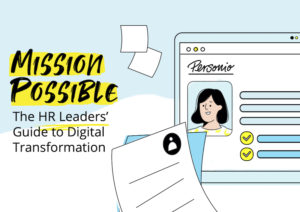
HR Business Plan Template
Unlock executive buy-in with our HR business plan template.
Get the templateFuture of Work: A New Era Of HR

Agile ways of working, hybrid working modes, and emerging HR technologies: The future of work is changing, or rather, it's starting anew. The mindsets of employees are changing, professional roles are fast redefining, and HR needs a way to keep up. Here is our primer on the trends shaping the future of work and what HR needs to keep in mind.
The future of work is already here: People Workflow Automation.
What is the Future of Work?
As a concept, the future of work represents a fundamental change in the working world. Governed by trends such as digitalisation, globalisation, virtual communication, and demographic changes are adding new layers and complexities into how work gets done. The future of work is shaped by new skills and new ways of working, ones which organisations needs to pick up (or potentially find themselves lost in the sands of time).
What Does HR’s Future Of Work Look Like?
The future of work isn’t a vague vision of cyborgs and AI, it already defines so much of how everyday working processes are gone about and how many modern companies operate. These are the companies that have built agile teams, are leading the way on hybrid or remote work, and are using HR software to automate their core people processes.
That’s just a taste of what’s to come, though, so let’s dive into the trends that are truly shaping the future of work. Moreover, how HR and People Teams can prepare themselves best based on those trends…
5 Powerful Trends Driving the Future of Work
1. Digitalisation
In the future of work, everything is digitalised. Moreover, new technologies are having far-reaching effects on previously-analogue processes or concepts. Here are two worth mentioning:
Changed Job Profiles – Many activities and responsibilities are changing, which is changing roles in tandem. Think about jobs like Marketing Automation Specialist or Social Media Manager, roles which would not have existed even ten years ago. HR and recruiters alike are now accounting for completely new roles in their workforce planning models.
New Ways of Working – Data is now playing a key role in centralizing not only employee data but the entire employee experience. HR software can serve as a single source of truth for all employee data, processes, and more. This relieves HR teams of keeping track with previously paper processes.
2. Decentralized Employees
Today, the whole world is interconnected: Ideas spread within seconds via the internet, travel is more convenient than ever, and cloud-based solutions facilitate data access from anywhere.
As a result, more and more employees are location-independent when they work. Virtual teams are a normal part of the future of work – and they, too, need to be coordinated, motivated, and acquainted with their company’s corporate culture.
3. Different Generations
Baby Boomers, Gen X, Millennials, and Gen Z: We know have more generations working under one roof than ever before. And, each has different tech skills and different ideas of what their ideal employer looks like. This means that HR professionals need to take a very close look:
Which competencies do you already have and which have to be developed so that employees can work smoothly?
How can employees of different generations work well together?
What incentives do different generations need to stay motivated?
Employees have different priorities. Apart from the salary, we also negotiate components that can be flexible, like vacation days.
–Stefan Zimmermann, Head of HR & Organisational Development at OPED.
4. Refreshed Attitudes Toward Work
The future of work is being defined by new attitudes toward the overall concept of ‘work.’ Here are three expressions of it through the eyes of emerging generations in the workforce:
Meaning & Purpose: Previously, work was purely an obligation and a means to an income, younger generations look for a deeper meaning in their job. Therefore, companies have to create a strong vision and communicate their culture and values to employees clearly.
Methods & Climate: Self-determined, creative, and independent work methods have become increasingly important. HR can guide this through the possibilities and quality of teamwork, but also with plain practical things like office furnishings that enhance employee comfort.
Spoiled for Choice: The scarcity of top-tier talent allows employees to have higher expectations of their employer. So, companies need to focus on attracting top talent, acquiring it, and retaining it. This can be done through employer branding, recruitment optimisation, and employee retention measures.
Personio allows you to free up time for HR’s most important topics. Start a trial today.
5. Agile Collaboration
In the future of work, work environments are being completely redefined. Collaboration must now become faster, more adaptable, and agile. “Agility should not be confused with flexibility; it requires a lot of discipline,” Stefan Zimmermann explains. “Agile teams are high-performing and have to collaborate methodically.”
This means that HR has to keep track of any possible requirements and the competency profiles of managers and employees. It also means that structures need to be built that facilitate agile work.
The Future of Work: How HR Is Changing Roles
Stepping into the future of work also requires a complete rethink over how we view HR. In the future, HR managers are no longer beholden to spreadsheets or simply managing processes, instead processes can run themselves, and HR teams can focus on developing and retaining talent.
Now, HR leaders have the golden opportunity to take an active part in shaping the change. “HR professionals are increasingly becoming organizational developers too,” says HR expert Stefan Zimmermann, who clearly sees his own role in the “unfolding of employee potential.”
HR Skills for the Future of Work
As a consequence, the skillset of HR professionals has to change as well: Effective recruiting, efficient HR management and meaningful employee development – all these demand new skills that are far beyond administration.
“People in HR need to be able to implement and use tools that make their work easier, such as HR software and project management tools,” adds Katja Bauer, CHRO at executive recruiting agency i-Potentials. Project management and IT user skills are followed by basic competencies to get HR and the whole organization ready for the future.
Which HR Skills are Required for the Future of Work?
Project management
Computer literacy
Analyses and evaluations of employee data
In-depth expertise, e.g. in tech recruiting
Strategic and methodical thinking
Of course, HR will continue to take care of a number of operational activities as well. But the attitude of HR professionals in the digital Future of Work era is important, says Zimmermann. “HR professionals have to adopt the mindset of organizational development managers. They have to think in methods.”
